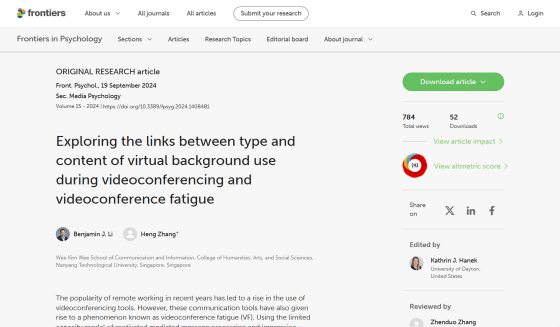Experiments reveal that changing background images is effective in avoiding 'Zoom fatigue' felt during video conferences

In recent years, video conferencing using Zoom, Microsoft Teams, etc. has become commonplace due to the pandemic and the spread of remote work, but video conferencing has also caused a phenomenon called '
Frontiers | Exploring the links between type and content of virtual background use during videoconferencing and videoconference fatigue
https://www.frontiersin.org/journals/psychology/articles/10.3389/fpsyg.2024.1408481/full

Experiment Reveals a Simple Trick to Avoid Zoom Fatigue : ScienceAlert
https://www.sciencealert.com/experiment-reveals-a-simple-trick-to-avoid-zoom-fatigue
Zoom fatigue is a term used to describe the physical and mental fatigue that can result from using video chat tools. Possible causes include 'using Zoom in all aspects of life, both at work and at home,' 'stress caused by slight delays in video calls and anxiety about not making eye contact,' 'reduction in non-verbal communication,' 'constantly looking at your own face on a screen,' and 'not being able to switch your thoughts or emotions when moving between conference rooms.'
What is the mechanism of 'online meeting fatigue' and how can it be overcome? - GIGAZINE

Recently, Nanyang Technological University researcher Heng Chan and his colleagues have studied 'virtual backgrounds used to hide the room behind you' as one of the factors that may affect Zoom fatigue.
Existing research suggests that people in video conferences spend most of their time focusing on themselves, not the people they're talking to, so the virtual background you set may affect fatigue during video calls.
'When people choose a background, they are essentially choosing a 'new suit' for themselves,' Chan said. 'Virtual backgrounds are not just decoration; they affect how users perceive themselves and how they are perceived by others.'
The research team conducted an experiment on 610 video conferencing users to examine the relationship between the background used during video conferencing and fatigue. All subjects were Singapore residents, worked from home an average of three days a week, were 284 men (46.6%) and 326 women (53.4%), and were aged between 22 and 76 years old.

Participants were given four video conferencing backgrounds: an image, a video, a blurred background, or no virtual background, and were asked which background they chose while working and to report on general, visual, social, motivational, and emotional fatigue. They also reported what type of background they used when using an image or video virtual background.
The results showed that participants who used video as their video conference background experienced the most fatigue, because 'the video background is constantly changing, presenting users with new information, consuming cognitive resources and increasing cognitive load,' the team noted.
Participants who had their actual backgrounds blurred also reported higher fatigue levels, and previous research has shown that blurred or grey backgrounds can lead to more negative emotions.
Among those who chose to use a background image, many chose images of offices or public spaces, likely to express their own professionalism. However, such 'efforts at self-expression' are amplified during video conferencing, which may lead to increased fatigue.
Those who chose 'natural scenery or fun, whimsical backgrounds' reported the lowest levels of videoconferencing fatigue. The research team explained the reason for this: 'This result may be because these background contents are not used for impression management. People who use these backgrounds may care little about how the background makes them look, or they may simply use them as a way to hide their actual background. As a result, the stress associated with managing one's image is eliminated, leading to lower videoconferencing fatigue.'

The team is encouraging people to use natural virtual backgrounds, such as mountains, forests or beaches, for work video conferences. 'This is a choice that strikes a balance between psychological comfort and maintaining appropriate social etiquette,' Chan said.
Related Posts:
in Free Member, Web Service, Science, Posted by log1h_ik






